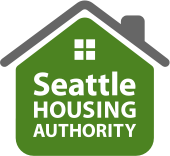Investigating the link between housing redevelopment and health at Yesler Terrace
Residents living in affordable housing have long recognized the ways access to health and social services can improve their well-being. Now, a new local study funded by the Robert Wood Johnson Foundation will evaluate just what those important links are for improving health for Yesler Terrace’s low-income, ethnically diverse residents. Public Health – Seattle & King County (PHSKC) and the Seattle Housing Authority (SHA) are the lead partners on the study.
Yesler Terrace is a 30-acre site near downtown Seattle that was developed by SHA in the early 1940’s as the city’s first publicly subsidized housing. When it became evident in recent years that infrastructure and 561 aging housing units needed to be replaced, SHA began a conversation with residents and community stakeholders about the future of Yesler. The redevelopment now underway is transforming Yesler into a mixed-income community with more housing, new parks and open spaces, increased transportation options, enhanced community services and greater economic opportunities.
Previous research has indicated that such community redevelopment initiatives can create healthier, more equitable neighborhoods and positive health outcomes. But there are significant knowledge gaps in how to measure the impacts on health of specific strategies related to community redevelopment. Yesler provides a unique opportunity to examine direct correlations between redevelopment and residents’ health. The study will look at multiple data sources over five years, 2012 to 2017, a period that covers pre-redevelopment through occupancy of new housing and expansion of collaborative community services.
The study will address three primary questions:
-
What is the combined impact of the Yesler redevelopment strategies on residents’ health and well-being?
-
What is the impact of the Yesler redevelopment on economic opportunities, education, crime/safety, and social connections?
-
Which subgroups of Yesler residents are most likely to benefit from these redevelopment strategies and how can strategies meet all residents’ needs?
Importantly, this study will use insight from individual resident experiences with data from a host of partners in order to assess the health impacts of changing physical, social and economic conditions.
“We are committed to strategies and partnerships that make housing just the first step in healthier, more equitable communities for people with low incomes,” said Andrew Lofton, Executive Director of the Seattle Housing Authority. “This study will help guide our work and make sure we are focusing on the most effective building blocks for improving residents’ lives.”
“This is an incredible opportunity to work with partners to make progress toward closing the health equity gap,” said Patty Hayes, Director of Public Health – Seattle & King County. “It is through innovative collaborations with residents, public health, affordable housing and social services that we will expand opportunities for all our community members to live healthier lives.”
Principal investigators for the study are Stephanie Farquhar, PhD, MA from PHSKC and John Forsyth, MPA from SHA. When the study is concluded results will be made available to study partners and the public.
About Public Health – Seattle & King County
Providing effective and innovative health and disease prevention services for over two million residents and visitors of King County, Public Health — Seattle & King County works for safer and healthier communities for everyone, every day.
About Seattle Housing Authority
The mission of the Seattle Housing Authority (SHA) is to enhance the Seattle community by creating and sustaining decent, safe and affordable living environments that foster stability and self-sufficiency for people with low incomes. SHA provides long-term, low-income rental housing and rental assistance to more than 30,000 people in the City of Seattle. SHA owns and operates approximately 8,000 units at nearly 400 sites throughout the city. SHA also handles more than 10,000 Housing Choice Vouchers (also known as Section 8), enabling low-income residents to receive rental assistance in the private housing market. Approximately 13,000 SHA residents are elderly or disabled and about 9,500 are children. SHA, a public corporation established in 1939, is governed by a seven-member Board of Commissioners, two of whom are SHA residents. Commissioners are appointed by the Mayor and confirmed by the City Council.
